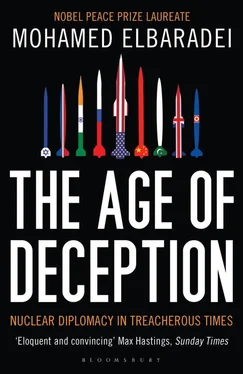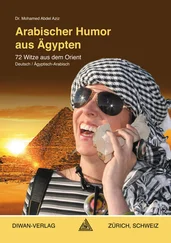In less than a minute, our phones began ringing off the hook. First, my brother Ali, calling from Cairo, glued to the TV. Then my secretary, Monika Pichler, ringing from the office to say that the Norwegian ambassador and his deputy had arrived with a huge bouquet of flowers. [7] The Nobel committee later said they were sure that if they called the IAEA the news would leak immediately. The ambassador told me he had bought a large bouquet the year before as well.
The ambassador was the only one who had been informed in advance by the Nobel committee. I invited them to come over to the house. Between the multitude of calls coming in and my emotional state, it was all I could do to get dressed.
After a hastily arranged press conference at the IAEA, I gave an impromptu speech to the Agency staff, who had crowded en masse into the boardroom. The room was electric: there were tears, laughter, and recurring waves of applause. To say that we were all thrilled and proud would not begin to describe the enormity of the moment. I do not expect to experience again in my lifetime the joy of sharing such extraordinary affirmation: my colleagues, people from more than ninety countries, had striven together to make the world more secure. The prize was the culmination of our efforts as an institution and of my forty years working for the common good.
The deluge of support rapidly became an avalanche. Emails jammed my in-box. Letters began arriving in stacks: the IAEA mailroom resorted to circulating them in overstuffed grocery bags. The thrill of these messages was that they were coming in from people from all walks of life and of all ages, ethnicities, and religions, from heads of state to schoolchildren. A group of Italian nuns wrote to promise their prayers for our future. Three hundred Spanish children from Fuenlabrada, a suburb of Madrid, sent individual letters of congratulations. [8] Two examples: From Javier, age 7: “I heard we had many people giving you support from Spain so that your inspectors would have more time so that there would be no war in Iraq. That is why we were so happy with your Nobel Peace Prize, and we hope that you will continue fighting for peace in the world. Congratulations!” From Alicia, age 12: “I am totally against wars, and I thank you very much for your efforts to try to avoid the war in Iraq. Despite the fact that your strategy, based on dialogue, was absolutely not to the liking of the USA, you knew how to stay firm and you showed that there were not nuclear weapons in Iraq, even while gaining the hate of the most powerful country. I hope that in the conflict with Iran you are luckier and that things get solved by using dialogue and not through arms. And that the politicians of the USA accept the opinions of the UN, and that they not always do whatever they want for their economic gain. I wish you luck and that you can continue using your main weapon: dialogue. With affection…”
Egyptian citizens of every description wrote to express their pride. This generous outpouring was at once immensely humbling and immensely uplifting.
I felt a great obligation to convey, through my Nobel lecture, my particular understanding of nuclear proliferation—as part of a much larger context of global inequality and the quest for human security. For some time, I had been trying, in speech after speech, to articulate the connections: the negative societal spiral began with poverty and inequality; which all too frequently coincided with poor governance, corruption, and human rights abuses; which in turn provided fertile breeding ground for extremism, violence, and civil wars, and, in some cases, in areas of unresolved conflict, the temptation to project power or achieve security parity by acquiring weapons of mass destruction.
Laban Coblentz, my communications assistant and speechwriter, and Melissa Fleming, the Agency spokesperson, had told me that the point was being lost on my audiences, even though they themselves understood my reasoning. The connections I saw were there, but I wasn’t driving the message home. I needed something more concrete: an image to capture the message.
I found my answer while thinking about how to use the money that accompanied the Nobel recognition. The prize had been awarded jointly to me, as Director General, and to the IAEA, as an organization. The award money totaled just over one million euros. The IAEA Board had determined that half the money would go to support cancer treatment and childhood nutrition in developing countries. My portion, I decided, would be put toward a cause I had known my whole life: the need to care for the orphans of Cairo. My sister-in-law was directly involved in the city’s orphanages; she could help me ensure that the funds were well spent.
Here was the image I wanted, the motif for my Nobel lecture: “My sister-in-law,” I wrote,
works for a group that supports orphanages in Cairo. She and her colleagues take care of children left behind by circumstances beyond their control. They feed these children, clothe them and teach them to read.
At the International Atomic Energy Agency, my colleagues and I work to keep nuclear materials out of the reach of extremist groups. We inspect nuclear facilities all over the world, to be sure that peaceful nuclear activities are not being used as a cloak for weapons programmes.
My sister-in-law and I are working towards the same goal, through different paths: the security of the human family.
The quest for security, I argued, was the motivation driving a multitude of human endeavors. But because our societal priorities were skewed, some nations of the world were spending more than a trillion dollars per year on armaments while two-fifths of the earth’s population were living on less than two dollars per day and nearly a billion were going to bed hungry every night. The world’s insecurities had gone absurdly awry. Nor was it possible to sustain such a model. “Today,” I wrote,
with globalization bringing us ever closer together, if we choose to ignore the insecurities of some, they will soon become the insecurities of all. Equally, with the spread of advanced science and technology, as long as some of us choose to rely on nuclear weapons, we continue to risk that these same weapons will become increasingly attractive to others.
I did not want to end the lecture on a note of gloom. It was Aida who came up with the idea of concluding with an invitation to imagine a better future:
Imagine what would happen if the nations of the world spent as much on development as on building the machines of war. Imagine a world where every human being would live in freedom and dignity. Imagine a world in which we would shed the same tears when a child dies in Darfur or Vancouver. Imagine a world where we would settle our differences through diplomacy and dialogue and not through bombs or bullets. Imagine if the only nuclear weapons remaining were the relics in our museums. Imagine the legacy we could leave to our children. Imagine that such a world is within our grasp.
To say that the ceremonies in Oslo were an unforgettable experience would be a severe understatement. The warmth of the reception offered to us by the Norwegian people and the royal family was stunning. It is an extraordinary thing to witness an entire capital city come to a halt, for three days of the year, in celebration of peace—from poetry and plays written and delivered by schoolchildren to the Nobel Peace Prize Concert, broadcasted to more than one hundred countries from the Oslo Spektrum Arena. I was particularly humbled by the tour of the Nobel museum, where I saw the images of those who had preceded me as peace laureates.
I was still nervous when I was asked to write in the Nobel book, inscribed by all the laureates. “We need to change our mind-set,” I wrote. “We need to understand the common values we share. We need to understand that war and force will not resolve our differences or move us forward toward peace. Only through dialogue and mutual respect can we move forward as one human family.” (But as luck would have it, I wrote the word “family” with a double “l”—a lapse my wife, Aida, still teases me about even today.)
Читать дальше












